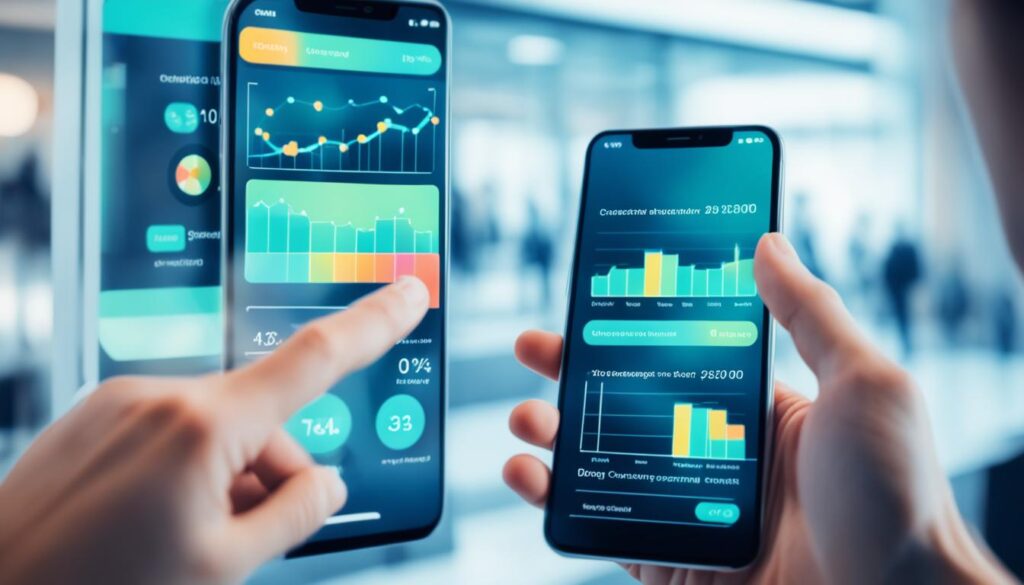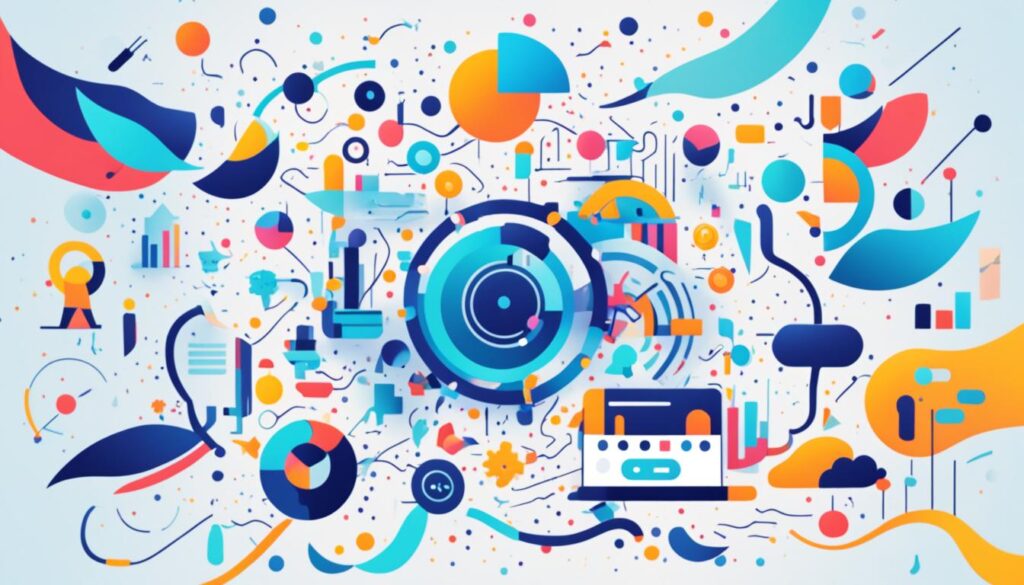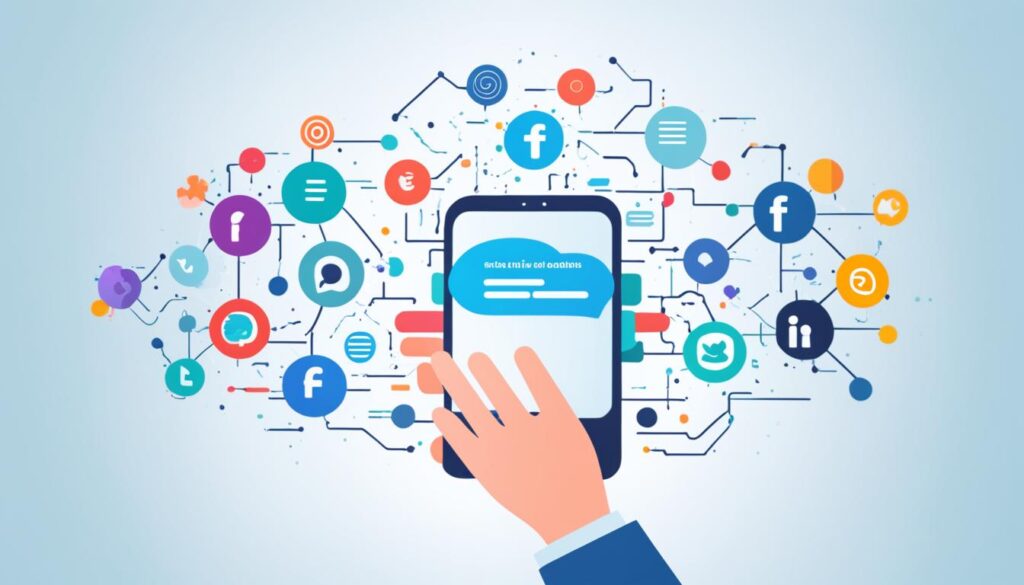“The best way to predict the future is to invent it.”
Alan Kay’s words ring true in the world of marketing today. AI-driven communication strategies let companies create personal connections with each customer. AI analyzes vast amounts of consumer data, spotting patterns. This is key in revolutionizing marketing tactics with AI.
Artificial intelligence in marketing is changing fast. Tools like Chat GPT, Canva, Synthesys, Synthesia.io, and Copy.ai are at the forefront. They make marketing efforts more personal and engaging. At the same time, they make everything more efficient and cost-effective.
Using AI in our marketing plans has helped us reach more people and get better results. But, embracing new tech means facing its challenges. This includes issues like data privacy, understanding AI outcomes, and keeping our campaigns human.
Key Takeaways
- AI marketing creates personalized strategies through consumer analysis.
- Tools like Chat GPT, Canva, Synthesys, Synthesia.io, and Copy.ai are pivotal in AI-led marketing communication.
- AI enhances engagement and conversion rates by delivering personalized content.
- Businesses report improved customer engagement and efficiencies through AI.
- Integrating AI in marketing poses challenges, including data privacy and lack of human touch.
Understanding AI in Marketing
Artificial intelligence (AI) in marketing is all about using AI technologies like machine learning and natural language processing. These technologies help make better decisions and boost campaign results. They let us quickly analyze big data, offering key insights for personalized marketing and task efficiency.
AI is becoming a big player in marketing, helping create content, boost customer experience, and provide accurate results. Technologies like chatbots, programmatic advertising, and SEO improve marketing efforts. They lead to smarter decisions, better ROI, and accurate tracking of success metrics.
Starting with AI in marketing begins with clear goals. You should bring on data experts with AI knowledge for success. It’s important to focus on data accuracy and pick solutions that fit campaign needs. Keeping data safe and obeying privacy laws is crucial for using AI well in marketing.
| Advantages of AI in Marketing | Challenges |
|---|---|
|
|
The benefits of AI in marketing are huge. By 2030, AI could add over USD 15 trillion to the world economy. Data shows that 64% of marketers now use AI tools, with 21% fully integrating them into their work. AI’s main uses in marketing are for analyzing data, market research, and creating content.
AI is saving businesses a lot of time—up to two hours and 24 minutes a day. As AI evolves, it’s set to change marketing, boosting how we engage and keep customers, leading to greater success in campaigns.
Benefits of AI in Marketing Communication
Using AI in marketing communication brings big benefits. It makes campaigns more effective and efficient. Marketers can make content that speaks directly to the user, streamline their work, and get people more involved.
Personalization
Personalization stands out as a key benefit of AI in marketing. AI helps send content that matches what each person likes. A survey by Persado showed that even expert marketers only pick the best messages 30% of the time. AI fills this gap. It figures out what customers like and sends messages at the perfect time.
Efficiency
AI makes marketing more efficient by automating tasks and complicated analyses. For example, digital marketing spending went up by 17%, reaching over $389 billion. AI simplifies these growing tasks, making decisions quicker. With 84% of marketing leaders valuing data management, AI lets their teams focus on bigger projects.
Engagement
For marketing to work, engaging the audience is crucial, and AI takes this to the next level. It uses tech like NLP and NLG for tailored interactions. Since 71% of consumers want personal experiences, AI boosts engagement and conversions. In fact, 88% of marketers say AI made customer journeys more personal across channels.
In summary, AI’s role in marketing is powerful, covering personalization, efficiency, and engagement. As AI grows, it becomes even more essential in marketing’s future.
AI-powered Tools Transforming Marketing Communication
AI is crucial in today’s marketing plans. It brings a bunch of AI-driven communication tactics and tools. These are changing the marketing world big time. Lots of AI platforms lead this big change. They help businesses boost their marketing talks a lot.
Chat GPT
Chat GPT is like talking to a human but through text. It’s key for AI-driven communication strategies that make chatting personal. By looking at loads of data, Chat GPT gives smart answers. It’s used in customer help, finding new customers, and marketing just for you.
Canva
Canva uses AI to make designing stuff easy and professional. It suggests design bits and the best layout with the help of machine learning. You don’t need to be a pro designer to create amazing marketing materials, thanks to Canva. It’s a must-have for modern marketing moves.
Synthesys and Synthesia.io
Synthesys and Synthesia.io are making marketing talk of the future. Synthesys creates voiceovers that sound real for videos, ads, and chatting with customers. Synthesia.io, however, makes video messages that feel personal. It helps pull in customers by catering to what they like.
Copy.ai
Copy.ai uses AI to write marketing text that hits the mark with your audience. It looks into what customers like and the latest trends. Then, Copy.ai makes messages that up your marketing game. It helps make anything from blog posts to ads for social media. It’s a jack-of-all-trades for marketers.
These AI tools show how AI is key in making marketing strategies work today. They do things automatically, make chatting feel personal, and give smart tips for winning strategies. These tools are vital for making marketing ways that grab attention and work wonders.
Challenges of Implementing AI in Marketing Campaigns
AI’s potential to transform marketing is clear, but it comes with challenges. These challenges are complex and multifaceted. Marketers must understand and overcome these difficulties.
Integration with Existing Systems
Integrating AI with old systems is tough. Many companies use outdated systems that don’t easily work with new AI tools. This makes implementing AI hard and often requires costly tech upgrades.
Data Privacy and Security
Data privacy is a big deal in AI. AI algorithms need lots of data to make good predictions. Keeping this data safe is critical. This is important as more laws focus on data protection.
Lack of Human Touch
AI can make things more efficient, but it lacks a human touch. Many marketers worry this over-reliance on AI could kill creativity. Keeping a balance between human insight and AI is vital.
Difficulty in Interpreting Results
Understanding AI data is often hard. Marketers struggle to get useful insights from AI data. There’s also a risk of AI bias, which can lead to mistakes. This makes accuracy in interpreting AI data very important.
Lack of Customization
Customizing AI to fit specific business needs is challenging. A significant number of marketers have to edit AI-generated content heavily. Crafting AI solutions that meet these unique needs is a tough hurdle to clear.
| Challenge | Impact | Solution |
|---|---|---|
| Integration with Existing Systems | Slow implementation, increased costs | Invest in system upgrades |
| Data Privacy and Security | Trust issues, potential legal ramifications | Adopt robust data protection measures |
| Lack of Human Touch | Decreased customer engagement | Blend AI with human creativity |
| Difficulty in Interpreting Results | Inaccurate insights, lost revenue | Enhance data analysis skills |
| Lack of Customization | Inefficient AI solutions | Develop tailor-made AI applications |
Using AI for Marketing Communication
AI understands consumer behavior by analyzing a lot of data. This makes marketing campaigns better and more personal. AI is used in marketing for creating content, providing virtual help, predicting trends, and improving ads. It’s important to show how AI can benefit marketing since 71% of people worry about their jobs because of AI.
AI makes marketing efficiency better by fast data analysis. It finds patterns and knows what customers like. It can do tasks like sending emails and scheduling posts. So, marketing teams can do more important work. This saves a lot of time and resources.
Personalization is key with AI. It can send messages that fit each customer by looking at what they do. AI chatbots change how we talk to customers, making service and sales better. AI also suggests content people might like based on what they’ve liked before.
AI makes marketing easier and more focused.
AI changes prices based on what’s happening in the market. This helps make more money and attract careful spenders. AI also sees what people think by looking at social media. So, marketers can talk to people better.
Using AI in marketing has many gains:
- More efficiency because of automation and looking at data
- Better personalization and more engagement
- Quick changes to marketing plans
It’s important to check AI for any unfairness regularly. Keeping data safe and private is also a top priority. We need to find a balance so customers don’t feel like they’re talking to a robot.
| Concerns and Predictions | Statistics |
|---|---|
| Concern about AI impacting job security | 71% |
| AI/automation tools impacting job performance by 2023 | 64% |
| Software having AI capabilities by 2024 | 57% |
| Generative AI tools like ChatGPT assisting jobs by 2024 | 56% |
Improving Customer Engagement with AI
In the fast-changing world of marketing, using AI to talk to customers is key for brands. We at AIContentfy saw how AI helped us grow to 100k/mo visitors in 10 months. AI helps make customer experiences personal. This builds loyalty and happiness.

AI boosts customer engagement by making marketing personal. It uses data and learning to fit each user’s likes and habits. This means better experiences for customers, leading to more sales and strong loyalty.
Also, AI tools like chatbots are available all the time to help customers. They answer quickly and can handle many questions at once. This makes things more efficient and leaves customers happy. AI helps solve problems fast and suggests products to customers.
AI is great at predicting what customers will do next. It looks at lots of data to see future trends. This lets companies find new customers and shape their marketing plans. Staying ahead in business and meeting customer needs is easier with AI.
AI makes marketing tasks simpler too. It saves time and effort, making things run smoother. For example, AI can make content that really speaks to people. This boosts how much customers interact with brands on social media and other places.
Last, good data is critical for AI to work well in engaging customers. Keeping data correct and current is crucial. With solid data, businesses can use AI to its full potential. This leads to amazing customer experiences, helping the business grow and succeed.
Real-Time Optimization of Marketing Strategies
In today’s digital world, real-time marketing optimization with AI is key to success. Using AI helps us change our plans quickly by looking at live data. This makes our marketing work better and respond faster.
AI marketing means we study customer data to make marketing very personal. This personal touch gets more people involved and leads to more sales. Canva, Synthesys, Synthesia.io, and Copy.ai show how AI can do jobs automatically. This makes things more effective while cutting costs.
Thanks to its fast analysis and learning, AI quickly spots patterns in customer data. This makes marketing more personal. It brings better engagement and more sales.
With dynamic AI marketing tactics, companies can watch their ads closely and tweak them right away. Changes in strategy, who to target, and creative parts keep performances high. Automation makes messaging across platforms consistent, improving customer experiences and loyalty.
| Aspect | Traditional Marketing | AI-Driven Marketing |
|---|---|---|
| Personalization | Limited | Highly Personalized |
| Efficiency | Manual Processes | Automated Tasks |
| Real-Time Adjustments | Delayed | Immediate |
| Cost-effectiveness | Varies | Cost-saving through Automation |
When using adaptive AI strategies, remember the challenges. Like fitting it with what we already use, keeping data private, and missing human interaction. Yet, the gains from real-time AI tweaks in marketing outweigh these issues, helping us reach our goals more effectively.
Leveraging Predictive Analytics in AI Marketing
Predictive analytics in AI marketing is changing the game. It lets businesses use big data to their advantage. By applying data, stats, and machine learning, we can guess future happenings.
This knowledge helps us spend our ad budget wisely, predict customer actions, and spot new trends. Making decisions becomes smarter and more strategic.
Forecasting Customer Behavior
Now, 95% of companies use AI predictive analytics in their marketing. It’s all about understanding what customers will do next. This means we can make ads that speak directly to them.
About 46% of marketers predict when customers will leave. Meanwhile, 40% figure out a customer’s value over time. Knowing what customers did before helps us guess what they’ll do next, letting us plan better.

Optimizing Ad Spend
Making the most out of ad budgets is key for better returns. AI forecasts let businesses use their money where it counts. For instance, Thinkific saw a big boost in leads turning into opportunities by using AI.
FleetPride made their warehouse work smoother and cut extra costs with AI models. It shows how AI can improve even non-marketing areas.
Identifying Market Trends
Spotting trends early gives companies an advantage. Predictive analytics helps see what’s coming. It’s gotten big thanks to more digital tech, better AI, and smart algorithms like MapReduce and Apache Spark.
These tools offer insights for quick action on market shifts. It’s all about being proactive in a fast-changing world.
| Company | Usage of Predictive Analytics | Outcome |
|---|---|---|
| KONE | Salesforce Service Cloud and Einstein Analytics | Enhanced service efficiency by predicting maintenance needs |
| Thinkific | Breadcrumbs Reveal analysis | Doubled MQL to OPP rate in 3 months |
| FleetPride | AI-powered predictive models | Improved order fulfillment accuracy and reduced overtime costs |
Using predictive analytics in AI marketing gives deep insights into customer behavior. It helps fine-tune ad spending and spot trends early. It all leads to decisions that push marketing forward.
Personalized Marketing Campaigns through AI
In today’s digital world, personalization in marketing is essential. Consumers want special experiences. So, general marketing no longer works. Thanks to AI personalization in marketing, we can connect deeply with our audience. This changes how we engage with customers.
AI uses big data to make targeted AI campaigns. These campaigns match people’s individual likes and needs. So, customers enjoy a better experience. Also, this boosts sales and ROI.
AI’s power lies in personalization at scale. Brands can now reach many yet cater to each user. But, there’s a big need to follow data protection laws closely. AI relies a lot on user data.
It’s key to have a strong privacy policy. Clear policies, managing consent well, regular checks, top-notch security, and staff training protect user data. Being open and using privacy-enhancing technologies also helps gain trust.
Blending AI with human touch is vital in marketing. AI makes things consistent and efficient. Yet, real people are key for true customer connections. So, mixing AI with human roles wisely, training our teams, and ethical feedback are necessary.
The future of personalized marketing looks bright. It aims to mix AI’s tech with human warmth. This mix will improve customer care and loyalty a lot. Picture emails made just for you or product suggestions from your past likes. AI can make unique customer moments come true.
Here, we outline the main pros and cons of using AI for personalization in marketing:
| Key Benefits | Considerations |
|---|---|
| Increased Customer Engagement | Data Privacy and User Consent |
| Improved Conversion Rates | Maintaining Human Interaction |
| Enhanced Brand Perception | Balancing Automation and Human Touch |
| Better Resource Allocation | Implementing Robust Data Security Measures |
| Competitive Advantage | Continuous Team Training and Feedback Loops |
Using AI in marketing let us give unique, thrilling experiences. This builds deeper loyalty and grows businesses sustainably.
AI in Social Media Marketing
Social media platforms now use AI, changing how we interact, share, and promote. AI helps marketers be more efficient and personalized in their approach. This changes the game in social media marketing.

Automating Social Media Posts
Automation is key in social media marketing. It saves time and increases productivity. Facebook and Instagram use AI to automatically create and schedule posts. This targets content to the right audiences at the right time.
By doing this, it cuts costs and keeps content consistent. AI tools predict what audiences will like and when they’re most active. This makes sure posts get the most engagement possible.
Analyzing Social Media Interactions
AI helps analyze social media to see what works and what people feel. It moderates comments and suggests content that users will find interesting. Through machine learning, AI makes smarter guesses about user behavior. This improves ad targeting and content recommendations.
Platforms like LinkedIn and Snapchat use AI for unique tasks. LinkedIn suggests jobs, and Snapchat recognizes images. AI monitors brands and analyzes feelings online. This helps marketers create strategies that truly connect with audiences.
| Function | Example | Benefit |
|---|---|---|
| Predicting Audience Preferences | Spotify | Personalized Playlists |
| Increasing Customer Engagement | Starbucks | Location-Based Offers |
| Identifying Influencers | L’Oréal | Authentic Engagements |
| Customer Support | KLM Royal Dutch Airlines | 24/7 Assistance |
| Image Analysis | Pinterest’s Lens | Visual Content Discovery |
Future Trends in AI-Powered Marketing
The future of AI in marketing looks very promising. It’s all about generative AI, better customer service, and smart data analysis. Big investments and teamwork in the industry are driving this change.
Generative AI for Content Creation
Generative AI is making waves right now. It’s changing how we create content, letting marketers make personalized content quickly. Big deals, like Microsoft teaming up with OpenAI and Amazon’s huge investment in Anthropic, show how much belief there is in this tech. Companies are using it to make new, AI-created content that really speaks to their audience.
AI-enhanced Customer Service
Customer service has been turned around by new AI technologies. Things like chatbots have been helpful, but now we have AI agents like AutoGPT and Microsoft Jarvis. These agents can do all sorts of tasks and offer help anytime, which makes customers happier and more loyal. AI is making customer interactions more complex and natural, changing how companies talk to their customers.
Advanced Data Analytics
AI is also making data analysis much smarter. This lets marketers understand their customers better and make smarter choices. Tools like causal AI look at why things happen, which helps with planning. Predictive analytics helps guess future customer actions and market changes, giving companies an advantage. AI helps target the right people more accurately, making marketing efforts more successful.
In summary, AI is revolutionizing marketing with creative content, better customer service, and smarter data use. This leads to marketing that is more personal, effective, and engaging.
Will AI Replace Humans in Marketing Communication?
AI in marketing communication isn’t here to replace us. Instead, it aims to work with us. Already, 50% of marketing pros use AI, while another 29% plan to start. Technology is getting more involved, improving how we work. Yet, it can’t do everything. We need people for their unique skills and creativity.
The future means humans and AI working together in marketing. McKinsey points out that more complex sales need more human touch. AI can’t quite mimic our deep thinking or our way of connecting with others. Things like creativity and understanding feelings are what make our work special. These are the things that AI can’t match.
Big names like Samsung, Apple, and JP Morgan are cautious with AI like ChatGPT. They worry about keeping data safe, highlighting the need for humans. A survey found that many tech workers think AI is overhyped. They stress that people are key to solving problems. They also add realness to campaigns that touch people’s hearts.
AI makes our jobs easier and helps us be more accurate. For example, WebFX uses AI and GPT to improve marketing plans. But this doesn’t take away from our personal touch. The best way forward combines AI’s smarts with our own talents. This mix lets us enjoy AI’s perks while keeping our connections real and meaningful.



